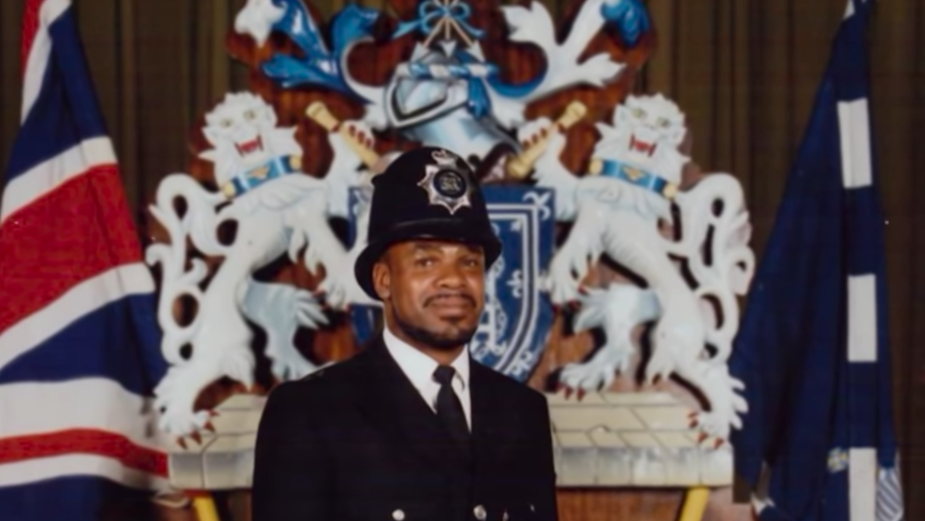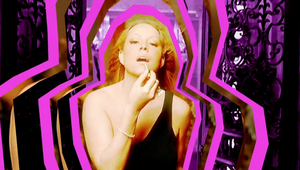
LBB Film Club: The Black Cop: A Villain, A Victim and A Hero

“I joined because I wanted to be white,” says ex-Metropolitan police officer Gamal ‘G’ Turawa in the BAFTA-nominated short film directed by Cherish Oteka and based on his life. This intimate story of Gamal’s experience as a police officer is a stark, honest representation of his soul searching journey over the years.
The black police officer who identifies as LGBTQIA+, shared the realities of conforming to a society that didn’t accept him as he was, forcing him to change himself to fit in. Spending his formative years in the care of foster parents, Gamal’s perception of himself and the world around him was warped into creating a narrative that would go on to shape his career as a police officer. After being branded as ‘other’, he did everything he could to conform and be seen as the ‘norm’, including taking part in some of the behaviours that the police force should actively be stopping. Gamal’s honesty and self-reflection are a refreshing take on a story that we may not have otherwise heard.
Cherish Oteka, director and producer at NERD Productions, speaks to LBB’s Nisna Mahtani about getting to know Gamal, capturing his story and support of The Guardian and BFI that made it happen.
LBB> Gamal’s story is about the complex challenges that ethnic minorities sadly have to face to this day. How did you come to know Gamal’s story, and when did you realise that this was something that everybody needed to hear?
Cherish> I first heard about G when I attended a workshop for LGBTQ+ people of colour. During the workshop, there was a breakout session to discuss role models within the community and G’s name came up. While I didn’t actually know the details of his story at the time, I reached out to him to generally make contact. G and I built a friendship from there and along the way, he shared details of the challenging parts of his journey. He was keen on sharing his story in the hopes that it could help and inspire other people. I knew that this was an important story of overcoming self-hatred and that is a universal journey that could connect with audiences.
LBB> Gamal is proud of who he is and has taken ownership of himself, his past and his identity - all of which he now uses to help better the lives of others. How has his story impacted you personally, and what impact do you think it will have on others?
Cherish> I hope the impact of hearing G’s story will be the same for others as it was for me. While G’s story is shocking and triggering in parts, making the film and meditating on these themes have been healing for me. His story provided an opportunity for me to reflect on pivotal moments I’ve had with my identity and the impact they have had on me. I think everyone can relate to being told directly or indirectly that there are parts of who they are that aren’t good enough. The intention behind this film is to make conscious what is largely unconscious when it comes to self-hatred.
LBB> Talk us through the timescale of the filmmaking process.
Cherish> Practically speaking, the film took five months to complete from first shoot date to delivery. With that being said, the film was five years in the making and came out of a friendship that grew between myself and the contributor. As well as this, I was pitching the film and faced many rejections along the way before it finally got commissioned by The Guardian and part funded by BFI’s Doc Society. It’s been a long journey towards making this film and I’m so pleased that it is connecting with audiences in a meaningful way.

LBB> The storytelling is captured by dramatised scenarios, real-life pictures and interview-style videos of Gamal. How and why was this the most effective way to tell the story?
Cherish> This story is so unique and is a real exploration of one person’s defining memories set against the backdrop of pivotal moments in British history. There are some truly unbelievable moments in the film, and it’s the documentary format that helps to centre this story in reality. Dramatic reconstruction was used to bring audiences into key moments in “G’s” life, propelling an immersive experience and delving into the subjective nature of memory. Archive is the grounding element of the film and helps to contextualise the memory scape.
LBB> Race and gender identity are common themes in your work. How do you tell stories to people who have so few touchpoints with the issues facing minorities?
Cherish> Identity as a whole is an area that I am interested in and we all have a sense of self. My approach to storytelling is to tell specific stories in universal ways. In that way, whether someone can directly relate to the struggles of marginalised communities or not is less relevant. It’s ultimately about the emotions that drive our collective experience of humanity and those feelings transcend race, sexuality, class, gender etc.
LBB> There’s a clear exploration of identity, as well as a rallying cry for equality and inclusion in this film. Why did you choose to centre the story of an individual rather than a group of people?
Cherish> G’s story alone touches so many important moments in recent British history. From the Black communities’ resistance to oppressive policing, to the push for LGBTQIA+ equality and the aftermath of the West African 'farming' phenomenon, where white families took care of Black children outside the remit of local authorities. There were so many important touchpoints in his story alone that allowed us to speak to several bigger societal issues. Because of this, I didn’t feel like we needed more voices to tell this story. Some of my favourite films are ones that tell big, complicated and nuanced stories through one persons’ perspective and that is what I sought to do with The Black Cop.
LBB> What was one aspect that you were eager to include in the final piece?
Cherish> There were two key parts of G’s journey that I was keen on having in the final film. I wanted to make sure that this is a story of redemption and reclaiming parts of our identity that we have been taught to hate. I’m interested in the light and the shade of his story and not purely focussing on the challenging parts of his journey but also highlighting how those challenging parts led him to be the inspirational person that he is today.
The second aspect I was keen on having in the film is the universality of this story. While the film is told through the prism of race, policing and sexuality - this story is ultimately about self-hatred and how to overcome it. I was keen on communicating that G’s story is everyone's story.

LBB> Can you tell us about any challenges that you faced during the editing process and how you overcame them?
Cherish> G’s journey spans decades and touches on several big and complex moments in recent British history. His journey also involves many emotional traumas and while his account is super subjective, it intersects with a broader context that was and still is being faced by marginalised communities. The challenge in the edit was striking the balance between the different and complicated parts of G’s journey and communicating them in a way that was easy for an audience to digest in a short film. Ultimately, I had to reflect on what I wanted an audience to leave with and that’s the message of hope and triumph. With that in mind, all the complexities of his story and how to communicate them became clearer.
LBB> Gamal’s story is inspiring but heart-breaking. Do you have a message for all the young people of colour out there who are silently internalising many of the same conflicts that he faced growing up?
Cherish> When we think of racism or any other form of bigotry we think of the big events and give little attention to the daily subtle comments and actions that can negatively impact self-esteem. I want us to acknowledge those events, the impact they have and begin or continue a journey of healing.
LBB> Tell us about the audience’s response to the film.
Cherish> It’s been so heartwarming to hear from audiences and see how they have deeply connected with the film. It’s hard to say what my favourite response has been but all of the responses that show the ways in which the film has been a catalyst for personal change have been the best for me. It’s lovely to hear that audiences are going on their own journeys of healing self-hatred and that the film has contributed to that.
LBB> Can you share any behind the scenes moments with us?
Cherish> The making of the face-painting scene could have been a film in and of itself. It was deeply affecting for the actors and crew and really helped us in gaining a fuller appreciation for the story behind the picture. It was a really interesting day where loads of conversations about identity took place. There were some passionate debates and understandings shared. It’s a shoot day that will stick with me for a long time.
















